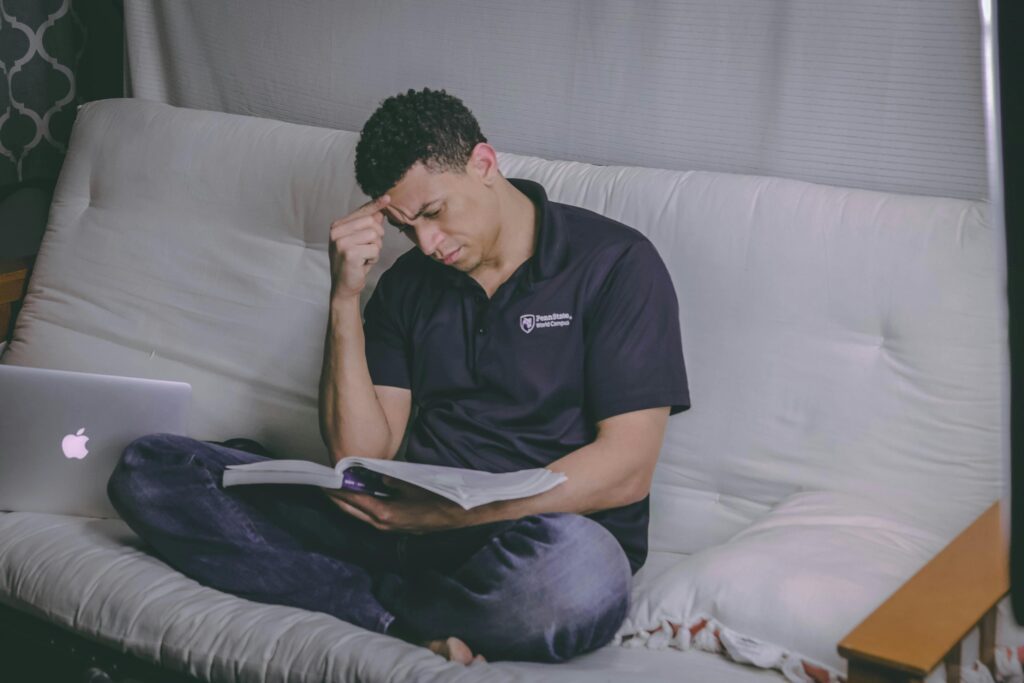Most of us find studying at home very hard and when there is an exam involved, it becomes even harder.
There are a bunch of challenges that make it even harder.
Read also: How do I report someone who lied to immigration UK?
First off, there are so many distractions at home, like your phone, TV, or even just the cosiness of your bed.
It’s super easy to get sidetracked.
Then, there’s the lack of a structured routine. In a classroom, you have a set schedule and a teacher guiding you. But at home, it’s all on you.
Read also: How to motivate yourself to study when you are tired
Without that structure, it’s easy to procrastinate and lose motivation.
Feeling isolated is another issue. You miss out on talking to classmates and getting quick help from teachers.
It can get lonely and frustrating when you’re stuck on something.
If you find it hard to study effectively for exams at home, follow the tips in this guide and you will overcome this issue.
Read also: Can I apply for express entry while studying in Canada?
Whether you’re a student navigating the challenges of remote learning or a professional pursuing further certifications, this will work for you.
How to study effectively for exams at home
The key to getting better at studying effectively at home is finding what works for you and staying consistent with it.
You can start by creating a study space for yourself at home.
-
Create a dedicated study space
Give yourself a special place to learn. Setting up a dedicated study environment is the first step towards effective home study.
Choose a quiet, well-lit area that is free from distractions – the lesser the distraction, the better the place is suitable for learning.
Read also: How to study for exams in one night
Keep the place organized, free from clutter, and away from high-traffic areas as well.
Inform your family or housemates about your study hours, and kindly ask for their support in minimizing disruptions during these times.
Make sure you have all the necessary materials and resources within reach to minimize disruptions during your study sessions.
Keep your books and every other thing you need to study close so you don’t have to get up and look for them while studying.
-
You need to establish a consistent study schedule
Now that you have a great place to study, you need to keep it consistent.
Consistency is the cornerstone of a successful home study.
Read also: How to earn money while studying abroad
You should develop a realistic and structured study schedule that aligns with your peak productivity hours.
Stick to this routine to create a sense of discipline and make studying a habit.
-
Set clear goals and objectives for yourself
Define clear and achievable study goals for each session.
Read also: How you can study if you have no money
Break down your larger objectives into smaller tasks, making it easier to track your progress.
This approach not only enhances focus but also provides a sense of accomplishment as you complete each task.
-
Utilize effective study techniques
Everyone has a study technique that works for them and you need to discover yours.
Experiment with various study techniques to discover what works best for you. Some effective methods include:
- Active recall: Quiz yourself on the material to reinforce learning.
- Spaced repetition: Review information at spaced intervals to enhance retention.
- Mind mapping: Create visual representations to organize and connect ideas.
- Teaching concepts: Explain concepts as if you were teaching them to someone else.
Once you find the technique that works for you, stick to it and after a while, you will see massive results.
-
Prioritize material and time management
To make your learning process even better, you need to identify the most important topics and allocate your study time accordingly.
Read also: What documents do I need for an Australian tourist visa?
Use the Pareto Principle (80/20 rule) to focus on the material that will yield the most significant results.
Break your study sessions into manageable chunks with short breaks to maintain concentration.
-
Utilizing focus techniques
Implement focus-enhancing techniques to combat distractions and remain focused throughout your study hours.
Read also: How can I extend my student visa in Australia
Techniques such as the Pomodoro Technique—where you work for a focused 25-minute period followed by a 5-minute break—can improve concentration and prevent burnout.
-
Utilize technology wisely
Technology is here to help you make life better. Leverage technology to enhance your study experience.
Educational apps, online resources, and productivity tools can be valuable assets.
Read also: Can I apply for PR while studying in Canada?
However, be mindful of potential distractions and set boundaries to maintain a productive study environment.
-
Incorporating breaks and physical activity
Break up your study sessions with short breaks to maintain mental freshness. Engage in physical activities during these breaks to boost your energy levels.
A quick walk, stretching, or even a short workout can reinvigorate both your body and mind.
-
Deal with isolation
Home study can sometimes lead to feelings of isolation, especially if you’re used to the camaraderie of a classroom environment.
Combat this by actively seeking social interactions, whether through virtual study groups, online forums, or regular check-ins with classmates.
Read also: Importance of choosing the right course in college
While at it, set specific start and end times for your study sessions to create a clear boundary between study and leisure.
-
Seek emotional support
Acknowledge the emotional aspect of studying at home, especially during exam preparation.
Share your concerns with friends, family, or mentors who can offer encouragement and understanding.
Having a support system can significantly impact your mental well-being and study effectiveness.
-
Engage in active learning
Passive reading is often less effective than actively engaging with the material.
Take notes, ask questions, and participate in discussions, whether online or with study partners.
Read also: How do I anonymously report someone to immigration in Australia?
Actively involving yourself in the learning process enhances understanding and retention.
-
Practice with mock exams
Simulate exam conditions by practising with mock exams or sample questions.
This not only familiarizes you with the exam format but also helps you manage time effectively and identify areas that need further review.
Conclusion
If you want to master the art of effective home study, you need to give yourself enough time.
You don’t master it overnight, it will take time but it’s worth the wait, start by creating the right environment for yourself, and setting clear and achievable goals. use an effective technique and break your learning time to make it interesting.
While you are building up, don’t hesitate to seek help if you encounter difficulties.
Read also: Chances of getting a Schengen visa after rejection
Reach out to teachers, classmates, or online forums for clarification on challenging topics. Maintain a positive mindset, and remind yourself of your capabilities.
Believe in your ability to succeed.



